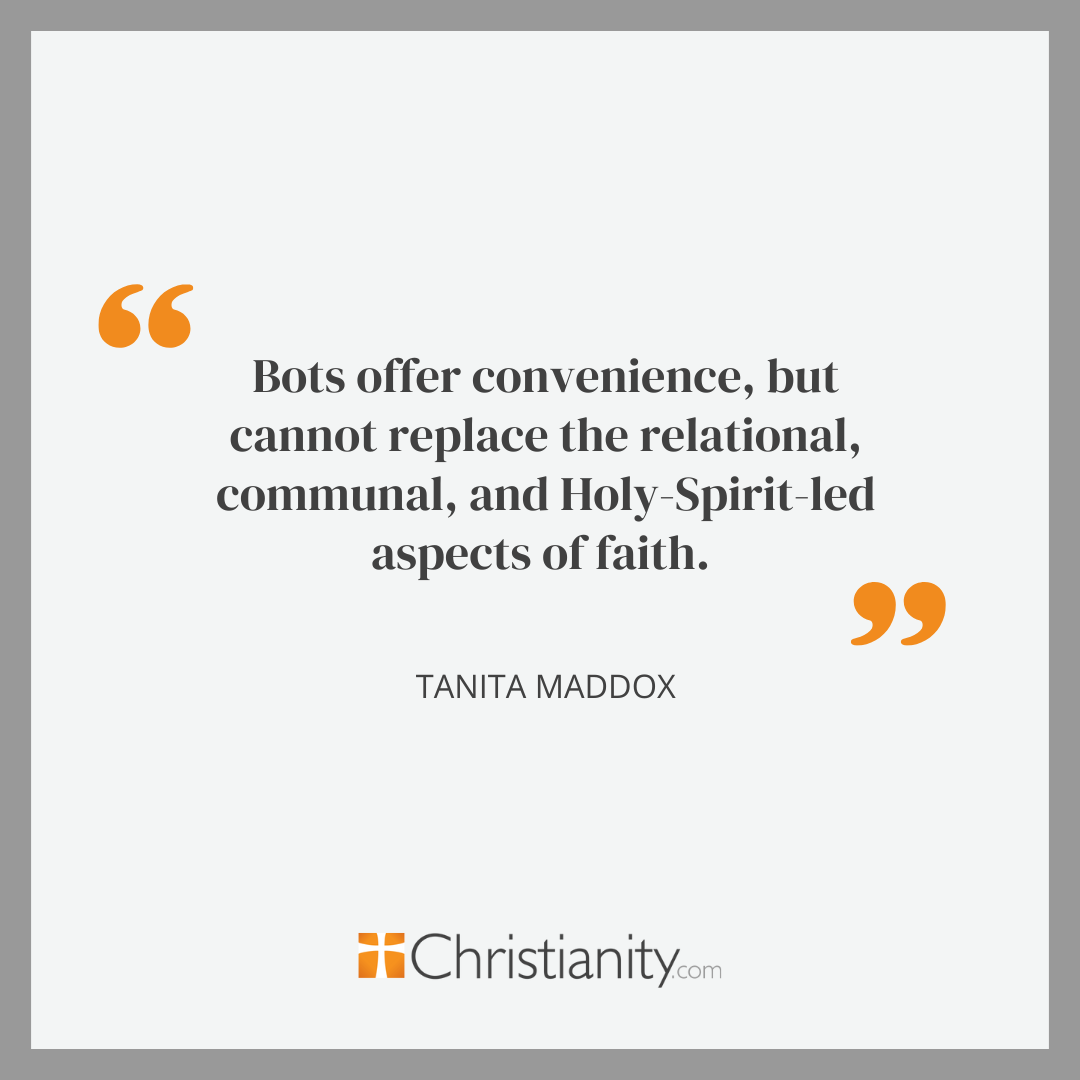At the Gospel Coalition conference in April, John Piper read a prayer produced by ChatGPT and then asked, “Is that praise?” It was a beautifully written prayer. It was eloquent and demonstrated an intimate knowledge of the Bible, attributes of God, and the life of faith and worship. However, Piper ultimately said in a loud voice, “NO!” He went on to say, “Computers do words better than you… They don’t feel anything.” In other words, AI can honor God with words, but their hearts are far from God (see Matthew 15:8), mainly because those hearts are non-existent for a bot.
According to the Barna Group, forty-nine percent of Gen Z Christians do not believe it is wrong to use AI to answer questions they have about religion to know what is true. However, Barna also found that only twenty-two percent of Christians somewhat agree or strongly agree that AI is good for the church. There is a generation divide regarding what AI should be used for and how it may or may not fit into the faith journey of individuals in the church. This is one area where different generations can lean in and rely on each other to figure out the role of AI and if there is a role for AI in today’s church. I’m sure there is a line between what is helpful and harmful regarding AI and our spiritual lives, but what is that line?
AI-powered religion apps are booming, with millions turning to chatbots that impersonate or parody religious authorities like priests, rabbis, or imams—some even greeting users with “My child.” Apps like Hallow have topped the App Store, been promoted by celebrities, and are praised for their 24/7 access. Do you know who else is accessible 24/7? The Triune God is available to us at all times and in all places. The Internet or data access does not limit our accessibility to God. But I digress.
Bots offer convenience, but cannot replace the relational, communal, and Holy-Spirit-led aspects of faith. Bots can search many translations of Scripture simultaneously and commentaries, but cannot pair that with an active understanding of God the Father, God the Son, and God the Holy Spirit. Bots can parody a spiritual director, but cannot share in the journey. In other words, misused AI can become a false prophet. This is nothing new. The Bible has warned us against false prophets, who come in sheep’s clothes (see Matthew 7:15).
To find a solution to the misuse of AI in our spiritual lives, we have to understand the problem. Simply telling people they cannot go to AI for spiritual guidance without understanding why they are there in the first place is offering a rule without understanding the unfulfilled need. We can uncover two significant things when we know why people are turning to digital chaplains and AI-generated spiritual guidance instead of the Bible, prayer, or members of their church community or leadership. First, we uncover unrecognized needs of our community and where we can adjust to help meet those needs. Second, we uncover where sin is pulling people away from the faithful life in Christ expressed in a believing community, and we begin to bring to light and minister to those areas.

Why Is a Digital AI Chaplain Attractive?
There is no risk of embarrassment.
When we have big, sometimes embarrassing questions, we risk feeling embarrassed or stupid when we ask them out loud to someone else. A person can judge us, but a bot lacks this ability or capability. We risk shifting our relationships by being seen in a different light by another person. Still, a bot only simulates relationships, and there is no risk in losing or changing that relationship with what we share. Bots often offer a judgment-free zone without relational impact, even offering compassionate responses.
There is not often a risk of an argument.
When we seek spiritual counsel, we enter a vulnerable space, hoping to be treated with care by the recipient of our questions. AI is programmed to offer alternative ideas to our own, but is not programmed to argue regarding non-factual issues, like moral issues or spiritual guidance. AI can offer advice or even a judgment, but ultimately, the user guides the conversation. There is no risk of a heated argument involving relational tension or strain, and no accountability afterward. AI does not call or come over to ask if I am following through with plans, and I do not risk arguing with AI about why I did or did not follow through.
We don’t have to forgive AI or be forgiven by AI.
AI does not require our forgiveness to continue in conversation. AI does not bring the complexity of human nature into interactions. It does not have a soul. It cannot hold a grudge and stay silent. AI can unintentionally harm, but in the back of our minds, we know it is a computer program, not a person who requires our forgiveness. I don’t need to forgive my vacuum cleaner when it doesn’t clean dirt on my floor as well as I expect it to. I don’t need to forgive my car for needing a repair. My vacuum cleaner and my car do not require my forgiveness when I get frustrated with them. AI offers a cheap relationship that has no cost to me.
Where Does AI Fail Us?
We are meant to bring things to the light.
We may risk embarrassment when we ask questions or share our journey with other members of the church, but this brings things into the light. And living in the light is what allows for our spiritual growth. We leave things in the dark when we only turn to AI and bots for spiritual guidance. And when questions, struggles, and sin are left in the dark, they grow, even fester in the darkness. We are embarrassed because we know better, but cannot let embarrassment control our actions. Resilience and maturity develop from moving past embarrassment to bring things to the light with brothers and/or sisters in Christ. Talking to a bot keeps things in the dark.
Debate can deepen the roots of our faith.
When winds push against trees, their roots are forced to grow deeper to hold the tree up. When too much water is at the ground's surface near trees, their roots stay at the surface and suffocate. Resistance forces growth. When we argue or disagree with another, we must examine what we truly believe and why. We are also forced to practice the fruits of the Spirit in the midst of that argument. We don’t get to set them on a shelf until a disagreement is finished. Instead, we learn to be in community and disagreement under the Holy Spirit's umbrella. This practice alone deepens the roots of our faith, as in the heat of the moment, we are forced to rely on God and not sin in our anger. Disagreement and debates are not enemies to the community, and we should not run from these things to run to a bot.
Forgiveness is a skill to develop.
From my experience, forgiveness is something we learn to do with practice. The more opportunities there are for forgiveness, the better we get at it. We get better at offering forgiveness (even when it is not asked for), and we get better at asking for it. The practice of forgiveness contributes to resilient relationships, and ultimately a resilient church, a church not easily shaken by conflict or hurt. God instructs us to practice forgiveness as God has forgiven us. This is only done in community with others. If there is no community, there is no one to forgive, or to forgive us. This may sound easier and simpler, but it ultimately is empty.
While AI can be helpful with facts, history, or summaries, it ultimately cannot offer light in the darkness. I am sure we, as the church, will learn how AI can assist in many ways, but it cannot replace a prayerful church walking in community together in the light.
Photo Credit: ©Unsplash/Mariia Shalabaieva





